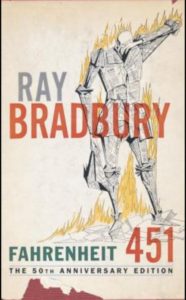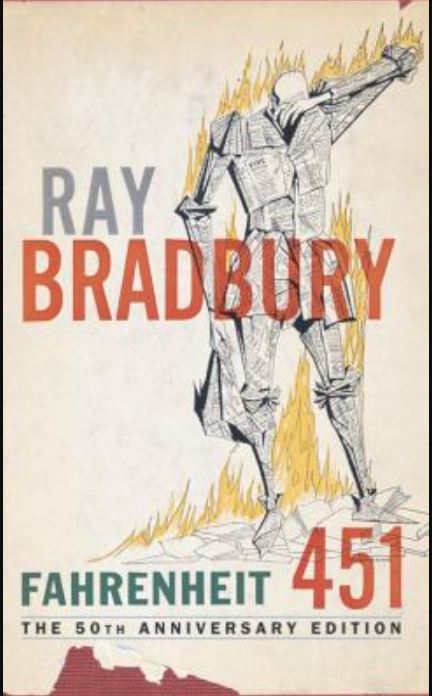 This speculative novel from almost 70 years ago, set in the future (around 2023, almost where we are now on the calendar!) depicts a world in which firemen start fires rather than put them out. Specifically, they burn books, which are forbidden, although not many people care. Most people are content to enjoy their TV shows and find no value in books. Despite defacto mindlessness, the authorities insist on absolute control, and anyone caught with a book is arrested. Anyone with a library of books in their house has the entire house burned down from the inside.
This speculative novel from almost 70 years ago, set in the future (around 2023, almost where we are now on the calendar!) depicts a world in which firemen start fires rather than put them out. Specifically, they burn books, which are forbidden, although not many people care. Most people are content to enjoy their TV shows and find no value in books. Despite defacto mindlessness, the authorities insist on absolute control, and anyone caught with a book is arrested. Anyone with a library of books in their house has the entire house burned down from the inside.
The main theme then is mind-control by the state, an Orwellian trope stemming from fear of Communism, Fascism, and in general, the coercive power of the state over the individual. But in this novella, there is also an interesting suggestion that firemen started burning books because they had nothing else to do. All houses had become fireproof so firemen would have been out of work if they hadn’t gone into the book-burning business. That’s a different indictment of state power, a slightly humorous one but not beyond plausibility when we think about the war-loving weapons industry and the “military-industrial” complex.
Somewhat predictably, our hero, Montag, a fireman, suffers existential emptiness and after he watches owners of personal libraries choose incineration with their books rather than live in a world without them, he becomes curious about what is in those books. He sneaks a book, then a couple of books, and discovers the world of reading. Predictably again, his transgression is discovered and he makes a frenzied escape into the wilderness, where he hangs out with “hobos” (which I guess were still a thing in the 1950s), and men who memorize books for posterity’s sake.
Of the many “great books” revered by Montag and other radicals, nonfiction was prominent. Hamlet, the Bible, and Uncle Tom’s Cabin are mentioned in passing, and Matthew Arnold’s Dover Beach is quoted, but examples of “great literature” are nearly all from science, philosophy, and history. Darwin, Schopenhauer, and Einstein are memorized, along with all the books of the Bible (which is non-fiction, right?) and the writings of Thomas Jefferson. Gulliver’s Travels gets a passing nod.
Books provide access to the meaning of life, it is suggested, and meaning is apparently the ability to think independently and critically and therefore, to argue well. Is that a good definition of life’s meaning? Bradbury struggles with the question and tries on other formulas to cover his bases. Meaning is reproductive biology, possibly; meaning is family; meaning is nature; meaning is history. He doesn’t know. Whatever it is, you find it in books. Not considered are that the meaning of life is curiosity itself, creativity, love and empathy. Paradoxically, though perhaps not surprisingly in the sci-fi genre, the characters did not expect to find much meaning in fiction. That’s a bias that still pervades sci-fi.
The ideas of the novel are obvious, predictable, and derivative, the characterizations flat, and the writing often cringeworthy. But hey, it’s Bradbury and it counts as “psi-fi” from the “golden age,” because it engages fundamental questions of human consciousness, using a light sci-fi wrapper as vehicle.
